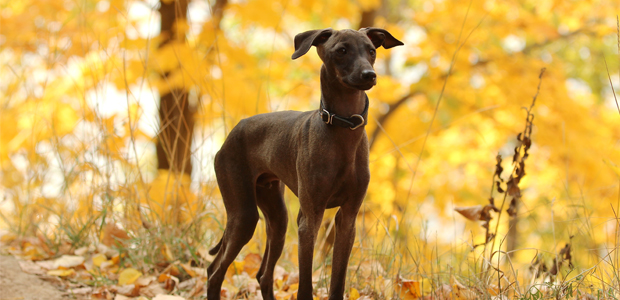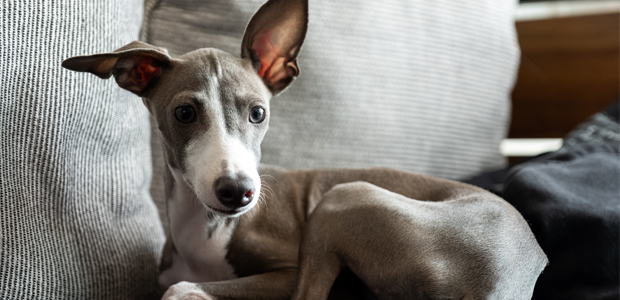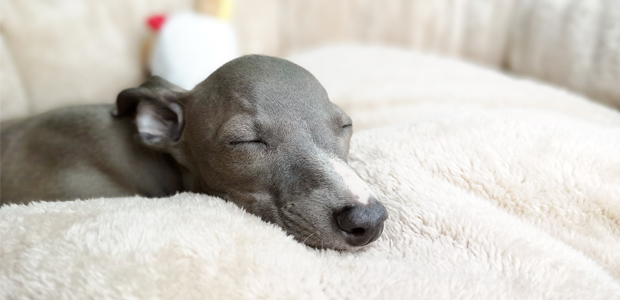The Italian Greyhound: is it the right breed for you?
Regal and slender, Italian Greyhounds are friendly dogs with bags of personality. These lively dogs form strong emotional bonds and have earned the nickname of ‘velcro dogs’ because they like to be near their owners.
They have a great deal of energy but are also couch potatoes when they’re indoors. Historically favoured by kings and queens, Italian Greyhounds are affectionately known as ‘Iggys’.
Italian Greyhound summary:
- Affectionate dogs with a slender build
- Coat is short and black, brindle, fawn, white or blue in colour
- Italian Greyhound life expectancy = 12 - 15 years
- Average size = 30 - 38 cm
- Average weight = 4 - 7 kg
- Estimated monthly cost = Medium
- Exercise needs = Medium
- Attention needs = High
- Sociability = Medium
Please note: A dog’s exercise, training/stimulation and grooming requirements can depend on several factors such as age and health. The same goes for ongoing costs of ownership. For advice on one specific dog, we always advise chatting with a vet.
How much exercise does an Italian Greyhound need?
Although Italian Greyhounds are classified as toy dogs, they do require a fair amount of exercise. Their energetic nature means that they love nothing more than zooming around the park.
They’ll require around 45 minutes - 1 hour of physical activity every day to make sure that their exercise needs are met.
If an Italian Greyhound is under-exercised, they can be prone to destructive behaviour, so it’s important for your Iggy to get the right amount of exercise – for your furniture’s sake!
The smallest member of the sighthound family, Italian Greyhounds may be distracted by anything they mistake for prey, so take care to keep your Iggy on the lead until you reach a secure or remote area.

Italian Greyhound dietary requirements
Your Italian Greyhound will need a balanced diet rich in nutrients, vitamins, and minerals. It’s best to feed them complete dog food to ensure that they are getting the right amount of vitamins and nutrients.
Growing pups may prefer 3-4 smaller servings during the day, rather than two larger meals. This can be reduced to two meals a day as your dog gets older.
The recommended portion size will depend on your individual dog. You’ll need to take into account their activity level, age and metabolism. To avoid weight gain, make sure your Iggy has a healthy and balanced diet and gets plenty of exercise.
Training: how to train an Italian Greyhound
Italian Greyhounds are intelligent dogs who respond well to training because of their eagerness to please their owners.
They can be independent-minded and more sensitive to scolding than most, so while it’s important not to scold any dog – especially when training – this is particularly the case for Italian Greyhounds.
As is the case with all breeds, Iggys will start to approach new experiences with caution when they are around 12 weeks old. Therefore, it’s really important for their development that they experience as many different situations as possible.
Grooming: do Italian Greyhounds shed?
Italian Greyhounds are low maintenance when it comes to grooming. Thanks to their short coat, a quick brush once a week will suffice. You should only need to bathe your Iggy when they get muddy.
Complete your Iggy’s grooming routine with regular tooth brushing, nail clips and ear checks.

Cost of owning an Italian Greyhound
When considering the lifetime cost of owning an Italian Greyoubd, remember to take into account the following costs:
- Breed-specific food
- Veterinary care
- Pet insurance
- Kennels or dog sitters
- Grooming costs
- Toys and equipment
- Preventative healthcare
As a rough guide, allow between £80 and £90 a month to cover the ongoing costs of owning an Italian Greyhound. Our vets have drawn up this handy guide to save dog owners money.
Are Italian Greyhounds prone to any health problems?
Italian Greyhounds are prone to certain health problems, just like all breeds. This doesn’t mean your dog is guaranteed to contract any particular disease – it’s just something to bear in mind.
To keep your Iggy as healthy as possible, monitor them closely and attend routine 6-month health checks with your vet. This will allow the vet to give your dog a thorough check-up and to pick up on minor (often symptomless) conditions before they have a chance to escalate into something worse.
Possible health complications for Italian Greyhounds include:
- Dental disease
- Infections
- Canine obesity
- Allergies
- Hip dysplasia
- Epilepsy
Before welcoming a new dog into your household, make sure you’re able to cover the costs of any routine or emergency medical treatment they may need. Pet insurance will help massively with this. Why not ask your vet about their recommended pet insurance policy?
Italian Greyhound temperament, socialising and ideal home environment
Italian Greyhounds are full of personality, although they can also be quite timid, so early socialisation is essential. ideally suited to young families who love to explore the great outdoors.
They need a fair amount of exercise, so if you’re keen to get out walking every day, they may just be the perfect furry friend for you.
They may mistake smaller pets – both in the house and those they encounter while out walking – for prey, so an Iggy may not be your ideal companion if you have a house full of small furries.
Whilst they are still so young and receptive, it's a good idea to introduce your Italian Greyhound to other dogs, people and livestock as well as car travel and unfamiliar noises, such as traffic.
Affectionate dogs that form strong bonds with their owners, Italian Greyhounds can be prone to developing separation anxiety. It’s good practice to leave them on their own for small periods during training so that they can get used to being by themselves.

Are Italian Greyhounds suitable for first time owners?
Due to their moderate exercise needs, sociability and small stature, Italian Greyhounds make a great choice for first-time owners.
Providing you can give your dog the attention and time it needs to develop into a happy and healthy pooch and can afford the associated costs that come with owning a dog, being an Iggy owner can be an enjoyable and rewarding experience.
Need more info?
For more info on finding the best dog breed for you and your lifestyle, have a chat with your vet. Find your nearest vet using our Find a Vet page.

